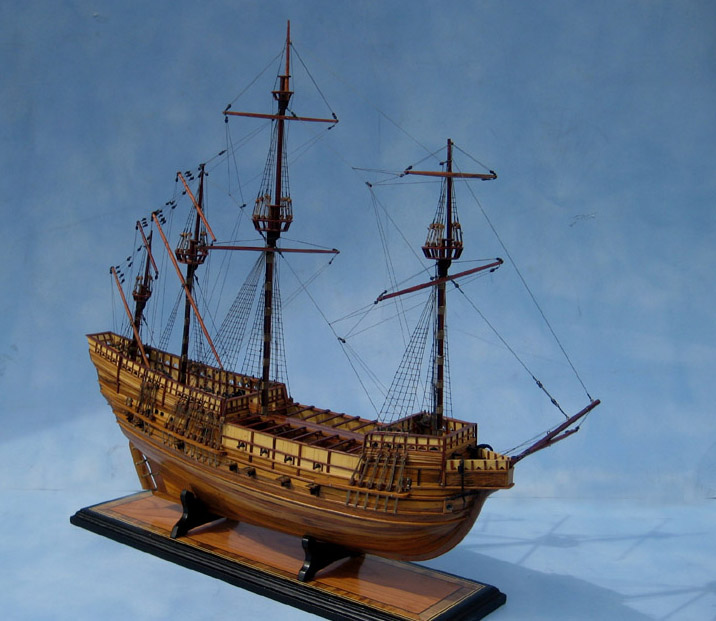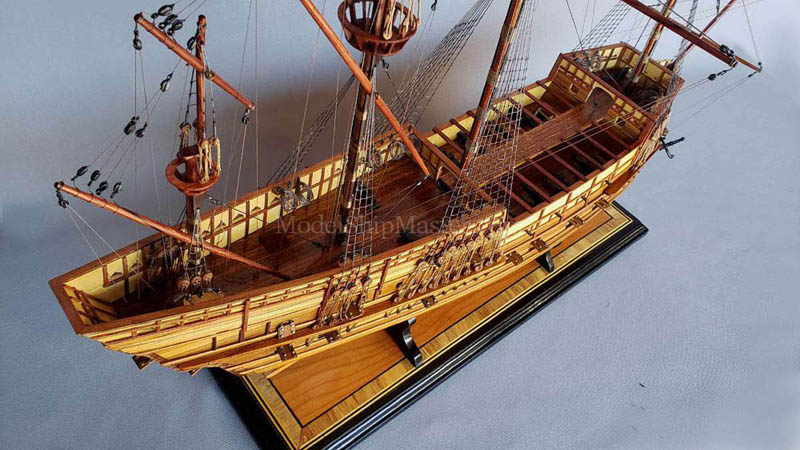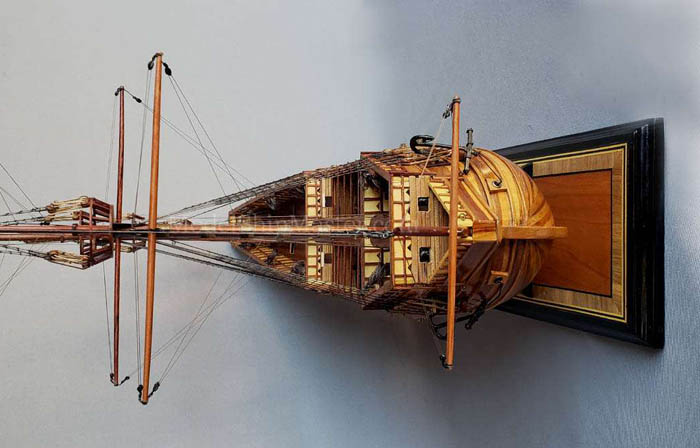|


256-bit encryption
$500,000 protection

|
HMS MARY ROSE model

.JPG)
The HMS Mary Rose
was one of the two large ships that were constructed
as part of a build-up of the English naval force in
the years between 1510 and 1515 against the threat of the French Navy.
She was launched in 1511 and served for 34 years in
several wars against France, Scotland, and Brittany.
Mary Rose's design was radical
in naval warfare. Rather than
clinker built,
she was
carvel built, which allowed watertight gun-ports.
Watertight gun-ports gave her the capacity to carry much heavier guns
which were required to be placed lower in the ship - near the
waterline. This made broadsides – coordinated
volleys from all the guns on one side of a ship –
possible for the first time in
history.
Constructing a warship of the size of the Mary Rose was
a major undertaking, requiring vast quantities of
high-quality material. For a state-of-the-art warship,
these materials were primarily oak. One estimate for the
number of trees is around 600 mostly large oaks,
representing about 16 hectares (40 acres) of woodland.
The huge trees that had been common in Europe and the
British Isles in previous centuries were by the 16th
century quite rare, which meant that timbers were
brought in from all over southern England. The largest
timbers used in the construction were of roughly the
same size as those used in the roofs of the largest
cathedrals in the High Middle Ages. An unworked hull
plank would have weighed over 300 kg (660 lb), and one
of the main deck beams would have weighed close to
three-quarters of a ton.
.JPG)
HMS
Mary Rose was a huge success. One of her many
trophies happened on August 10th, 1512 when she
attacked the French flagship and forced her out of
the battle with 300 dead and injured.
The sailing capabilities of the Mary Rose were
commented on by her contemporaries and were once
even put to the test. In March 1513 a contest was
arranged off The Downs in which she raced against
nine other ships. She won the contest, and Admiral
Edward Howard described her enthusiastically as "the
noblest ship of any great ship." Writing to the
King afterwards, the captain
described her as... "Your good ship, the flower, I throw, of all ships that ever sailed"...
Several years later, while sailing between Dover and
The Downs, Vice-Admiral William Fitzwilliam noted
that both the Henry Grace à Dieu and the Mary Rose
performed very well, riding steadily in rough seas
and that it would have been a "hard chose" between
the two.
Mary Rose was the
King's favorite. In
October 1526, after a major restoration
requiring caulking from the keel up, the
ship was recorded as being "good for the wars or
else for the King's pleasure."

Mary
Rose saw her last action on 19 July 1545 when she
led the attack on the galleys of a French invasion
fleet, and sank in the Solent, the strait north of
the Isle of Wight.
The wreck
of the Mary Rose was located in 1971 and was raised on
11 October 1982 in one of the most complex and expensive
maritime salvage projects in history. The surviving
section of the ship and thousands of recovered artifacts
are of great value as a Tudor period time capsule. The
excavation and raising of the Mary Rose was a milestone
in the field of maritime archaeology, comparable in
complexity and cost to the raising of the 17th-century
Swedish warship Vasa in 1961.
The finds
include weapons, sailing equipment, naval supplies, and
a wide array of objects used by the crew. Many of the
artifacts are unique to the Mary Rose and have provided
insights into topics ranging from naval warfare to the
history of musical instruments. The remains of the hull
have been on display at the Portsmouth Historic Dockyard
since the mid-1980s. An extensive collection of
well-preserved artifacts is on display at the Mary Rose
Museum, built to display the remains of the ship and its
artifacts.

This scratch-built
plank-on-frame
Mary Rose model is
27" L x 25" T x 11"W. Sale $2,750
 Shipping and insurance
in the contiguous US included. Other places: $350
flat rate.
This model is in stock and will be shipped within 5 business days.
Shipping and insurance
in the contiguous US included. Other places: $350
flat rate.
This model is in stock and will be shipped within 5 business days.
"Hello, We received the model just in time last week,
and it was a big hit at the event we were presenting at!
We had a lot of very positive comments, including from
the museum curator. Thanks much for making it possible!
-- Eric S. Director, Knights of Veritas"
|